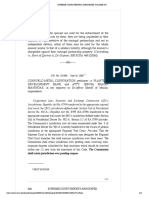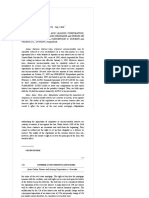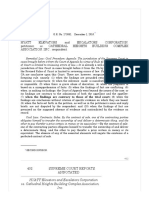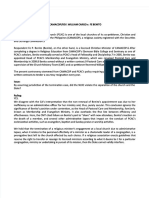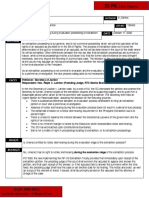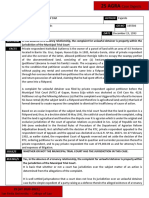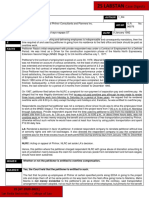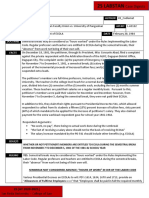Pdf-Riviera Compress
Pdf-Riviera Compress
Uploaded by
michelle zatarainCopyright:
Available Formats
Pdf-Riviera Compress
Pdf-Riviera Compress
Uploaded by
michelle zatarainOriginal Title
Copyright
Available Formats
Share this document
Did you find this document useful?
Is this content inappropriate?
Copyright:
Available Formats
Pdf-Riviera Compress
Pdf-Riviera Compress
Uploaded by
michelle zatarainCopyright:
Available Formats
Riviera v. CCA,
G.R. No. 173783, 17 June 2015, 758 SCRA 691
FACTS: Riviera Golf, a domestic corporation, is the owner of Riviera Golf Club (Club), a 36-hole golf
course and recreational facility in Silang, Cavite. On October 11, 1996, Riviera Golf entered into a
Management Agreement with CCA Holdings, B.V. (CCA Holdings), a foreign corporation, for the
management and operation of the Club.
The Management Agreement was for a period of five (5) years. Under this agreement, Riviera Golf
would pay CCA Holdings a monthly Base Management Fee of 5.5% of the Adjusted Gross Revenue
equivalent to US$16,500.00 per month, adjusted to4.5% per month from the opening date, plus an
incentive Management Fee of 10% of the Gross Operating Profit.
The parties also entered into a co-terminous Royalty Agreement that would allow Riviera Golf and the
Club’s developer, Armed Forces of the Philippines’ Retirement and Separation Benefits System (AFP-
RSBS), to use CCA Holdings’ name and facilities to market the Club’s shares. In consideration of the
G olf and AFP-RSBS will pay CCA Holdings a gross licensing fee
license to use CCA Holdings’ name, Riviera Golf
of 1% on all members
membership
hip fees paid in the sale o
off shares, an additional gross licensing fee of 4% on all
club shares, and 7% on non-golf memberships sold.
On October 29, 1999, Riviera Golf sent CCA Holdings a letter informing the latter that it was pre-
terminating the Management Agreement purportedly to alleviate the financial crisis that the AFP-RSBS
was experiencing. The Royalty Agreement was also deemed pre-terminated.
CCA Holdings protested the termination of the agreement and demanded that Riviera Golf settle its
unpaid management and royalty fees. Riviera Golf however refused on the ground that CCA Holdings
violated the terms of the agreement.
In April 2001, CCA Holdings filed before the Regional Trial Court (RTC), Branch 146, Makati City, a
complaint for sum of money with damages docketed as Civil Case No. 01-611 (first complaint) against
Riviera Golf. During the pendency of the case, the parties tried to extrajudicially settle their differences
and executed a Compromise Agreement.
Subsequently, or on November 22, 2002, CCA Holdings again sent a letter to Riviera Golf, this time,
demanding the sum of US$390,768.00 representing the projected net income or expected business
profits it was supposed to derive for the unexpired two-year term of the Management Agreement.
Noting that the first and second complaints involve the same parties, the same subject matter, and the
same causes of action, Riviera Golf filed on August 6, 2003, a Motion to Dismiss on the grounds of res
judicata and violation
violation of th
the
e rule against splitting of causes of action.
action. CCA Holdings oppo
opposed
sed the m
motion
otion
contending that there is no splitting of causes of action since the two cases are entirely independent of
each other. CCA Holdings also justified its belated filing of the second complaint, arguing that the
needed financial records were in Riviera Golf’s possession.
ISSUE: Wherther CCA H
Holdings
oldings villolated th
the
e prohibitions against
against res judicara and splittin
splitting
g a single
cause of action?
HELD: Yes. Res jud
judicata
icata requires the concurre
concurrence
nce of the followi
following
ng requisite
requisites:
s: (1) the forme
formerr judgment
must be final; (2) it must have been rendered by a court having jurisdiction of the subject matter and the
parties; (3) it must be a judgment on the merits; and (4) there must be, between the first and second
actions (a) identity of parties, (b) identity of subject matter, and (c) identity of causes of action.
All the Elements of Res Judicata are Present. A cause of action may give rise to several reliefs, but only
one action can be filed.8 A single cause of action or entire claim or demand cannot be split up or divided
into two or more different actions. The rule on prohibiting the splitting of a single cause of action is
clear. Section 4, Rule 2 of the Rules of Court expressly states:
Section 4. Splitting a single cause of action; effect of. – If two or more suits are instituted on the basis of
the same cause of action, the filing of one or a judgment upon the merits in any one is available as a
ground for the dismissal of the others.
In both Civil Case No. 01-611 and Civil Case No. 03-399, CCA Holdings imputed the same wrongful act –
the alleged violations of the terms and conditions of the Management and Royalty Agreements. In Civil
Case No. 01-611, CCA Holdings’ cause of action rests
re sts on Riviera Golf’s failure to pay the lice
licensing
nsing fees,
reimbursement claims, and monthly management and incentive fees. In Civil Case No. 03-399 on the
other hand, CCA Holdings’ cause of action hinges on the damages it allegedly incurred as a result of
Riviera Golf’s premature termination of the Management and Royalty Agreements
Agreem ents (i.e., the expected
business profits it was supposed to derive for the unexpired two-year term of the Management
Agreement). Although differing in form, these two cases
c ases are ultimately anchored on Riviera Golf’s
breach of the Management and Royalty Agreements. Thus, we conclude that they have identical causes
of action.
You might also like
- 23, RivieraDocument1 page23, RivieraRegina CoeliNo ratings yet
- 2023 HO 2 - Remedial Law - Civil ProcedureDocument20 pages2023 HO 2 - Remedial Law - Civil Procedurelovelycruz yano83% (6)
- KMM v. Cargill - Reply 080417Document27 pagesKMM v. Cargill - Reply 080417marizamoraNo ratings yet
- G.R. No. 173783, 17 June 2015, 758 SCRA 691: Riviera v. CCADocument2 pagesG.R. No. 173783, 17 June 2015, 758 SCRA 691: Riviera v. CCAJunelyn T. Ella100% (1)
- Riviera Golf Club, Inc. vs. CCA Holdings, B.V.Document17 pagesRiviera Golf Club, Inc. vs. CCA Holdings, B.V.Jo Marie SantosNo ratings yet
- GR 173783 Riviera V CcaDocument4 pagesGR 173783 Riviera V CcaRogie ToriagaNo ratings yet
- Complaint Docketfees Forum Shopping Barmatter1922Document89 pagesComplaint Docketfees Forum Shopping Barmatter1922Alelojo, NikkoNo ratings yet
- RIVIERA GOLF CLUB v. CCA HOLDINGSDocument14 pagesRIVIERA GOLF CLUB v. CCA HOLDINGSAkiNo ratings yet
- Riviera Golf Club V CCA HoldingsDocument12 pagesRiviera Golf Club V CCA HoldingsSecret SecretNo ratings yet
- Riviera Golf vs. CCA, GR No. 173783 (June 17, 2015) : Brion, J.Document27 pagesRiviera Golf vs. CCA, GR No. 173783 (June 17, 2015) : Brion, J.ybunNo ratings yet
- Splitting Cause of ActionDocument23 pagesSplitting Cause of ActionChris.No ratings yet
- Of Tbe Flbilippines !fmanila: QcourtDocument13 pagesOf Tbe Flbilippines !fmanila: QcourtRain100% (1)
- Riviera Golf Club Ine v. CCA Holdings B.V. G.R. No. 173783, 17 June 2015Document1 pageRiviera Golf Club Ine v. CCA Holdings B.V. G.R. No. 173783, 17 June 2015Kevin BesaNo ratings yet
- Riviera Golf Club Vs CCA HoldingsDocument1 pageRiviera Golf Club Vs CCA HoldingsKevin BesaNo ratings yet
- SEC vs. Subic Bay Gold Case DigestDocument1 pageSEC vs. Subic Bay Gold Case Digestkikhay11100% (4)
- Civ Pro - Riviera Golf, Inc. vs. CCA Holdings, G.R. No. 173783, June 17, 2015Document1 pageCiv Pro - Riviera Golf, Inc. vs. CCA Holdings, G.R. No. 173783, June 17, 2015Nilfpe SalcedoNo ratings yet
- 6 RCBC VS IAC (Case Digest)Document2 pages6 RCBC VS IAC (Case Digest)Romeo Rivera0% (1)
- SEC vs. Subic BayDocument3 pagesSEC vs. Subic BayCaitlin KintanarNo ratings yet
- Baker v. Gold Seal Liquors, Inc., 417 U.S. 467 (1974)Document14 pagesBaker v. Gold Seal Liquors, Inc., 417 U.S. 467 (1974)Scribd Government DocsNo ratings yet
- 324 Riviera Golf Club V CCA HoldingsDocument2 pages324 Riviera Golf Club V CCA HoldingsLouis Tan100% (1)
- SRC DigestDocument5 pagesSRC DigestJoyceNo ratings yet
- Consuelo Metal Corporation vs. Planters Development Bank 555 Scra 466Document12 pagesConsuelo Metal Corporation vs. Planters Development Bank 555 Scra 466Quennie Jane SaplagioNo ratings yet
- FRIA DigestsDocument14 pagesFRIA DigestsTen LaplanaNo ratings yet
- Nego Module 3Document17 pagesNego Module 3randomvdlmxNo ratings yet
- 10000016319Document52 pages10000016319Chapter 11 DocketsNo ratings yet
- SRC - My Case DigestDocument26 pagesSRC - My Case DigestGlargo GlargoNo ratings yet
- $RK74OQPDocument22 pages$RK74OQPMary grace ApostolNo ratings yet
- United States Court of Appeals, Third CircuitDocument5 pagesUnited States Court of Appeals, Third CircuitScribd Government DocsNo ratings yet
- Rules 1 12 FinalDocument51 pagesRules 1 12 FinalAnonymous r1cRm7FNo ratings yet
- Fria Case Digest - TamoDocument7 pagesFria Case Digest - TamojckctamoNo ratings yet
- In Re:) : Debtors.)Document50 pagesIn Re:) : Debtors.)Chapter 11 DocketsNo ratings yet
- In Re) Chapter 11: in The United States Banuptcy CourtDocument14 pagesIn Re) Chapter 11: in The United States Banuptcy CourtChapter 11 DocketsNo ratings yet
- Consuelo Metal Corporation vs. Planters Development BankDocument11 pagesConsuelo Metal Corporation vs. Planters Development BankJeliSantosNo ratings yet
- 1 Watercraft Venture Corporation vs. Wolfe PDFDocument26 pages1 Watercraft Venture Corporation vs. Wolfe PDFdoraemoanNo ratings yet
- In The Bankruptcy Court The District Delaware: StatesDocument9 pagesIn The Bankruptcy Court The District Delaware: StatesChapter 11 DocketsNo ratings yet
- Topic 2 .3 Digests DelayDocument16 pagesTopic 2 .3 Digests DelayRaihan Vincent CardenasNo ratings yet
- (2018) 2 SLR 0655 PDFDocument128 pages(2018) 2 SLR 0655 PDFSulaiman CheliosNo ratings yet
- Judgment To Motion For ReconsiderationDocument7 pagesJudgment To Motion For ReconsiderationPO HernandezNo ratings yet
- 08-Saguid V Security FinanceDocument23 pages08-Saguid V Security FinanceJesus Angelo DiosanaNo ratings yet
- SEC vs. Subic Case DigestDocument2 pagesSEC vs. Subic Case DigestClarissa Degamo100% (3)
- Forest Hills Vs Vertex SalesDocument5 pagesForest Hills Vs Vertex SalesZazaNo ratings yet
- Premium Finance Agreement An GratingDocument18 pagesPremium Finance Agreement An GratingChapter 11 DocketsNo ratings yet
- Petitioner Vs VS: Third DivisionDocument8 pagesPetitioner Vs VS: Third DivisionsobranggandakoNo ratings yet
- 10000015201Document9 pages10000015201Chapter 11 DocketsNo ratings yet
- United States Court of Appeals: For The First CircuitDocument16 pagesUnited States Court of Appeals: For The First CircuitCorla Reeves JacksonNo ratings yet
- Court'S Abandonment Order in Part For Certain Alaska Assets and (B) Authorizing The DebtorsDocument20 pagesCourt'S Abandonment Order in Part For Certain Alaska Assets and (B) Authorizing The DebtorsChapter 11 DocketsNo ratings yet
- Trust Fund Doctrine Case DigestDocument23 pagesTrust Fund Doctrine Case DigestArbasit TulawieNo ratings yet
- Asian Cathay Finance and Leasing Corporation vs. GravadorDocument12 pagesAsian Cathay Finance and Leasing Corporation vs. GravadorAnonymous WDEHEGxDhNo ratings yet
- ADR Module 1 CasesDocument21 pagesADR Module 1 CasesChino CubiasNo ratings yet
- Leg Res CasesDocument5 pagesLeg Res CasesVina LangidenNo ratings yet
- SRC Reading MaterialDocument6 pagesSRC Reading Materialfergie1trinidadNo ratings yet
- 12 Asian Cathay Finance V Sps Gravador and de VeraDocument9 pages12 Asian Cathay Finance V Sps Gravador and de VeraAnne VallaritNo ratings yet
- MR Holdings V BajarDocument3 pagesMR Holdings V BajarBianca LaderaNo ratings yet
- United States Court of Appeals, Fourth CircuitDocument13 pagesUnited States Court of Appeals, Fourth CircuitScribd Government Docs100% (1)
- Hyatt Elevators v. Cathedral HeightsDocument14 pagesHyatt Elevators v. Cathedral HeightsHilleary VillenaNo ratings yet
- Adr Cases Compilation PDFDocument67 pagesAdr Cases Compilation PDFLemuel Angelo M. EleccionNo ratings yet
- Asian Cathay Finance and Leasing Corporation vs. GravadorDocument9 pagesAsian Cathay Finance and Leasing Corporation vs. Gravadorcharmae casilNo ratings yet
- Safic AlcanDocument14 pagesSafic AlcansdfsdfsdNo ratings yet
- Heirs of Asis v. G.G. Sportswear Manufacturing CorporationDocument3 pagesHeirs of Asis v. G.G. Sportswear Manufacturing CorporationReena AcopNo ratings yet
- California Supreme Court Petition: S173448 – Denied Without OpinionFrom EverandCalifornia Supreme Court Petition: S173448 – Denied Without OpinionRating: 4 out of 5 stars4/5 (1)
- Performance Disputes in Shipping: A Collection of Case Notes from IndiaFrom EverandPerformance Disputes in Shipping: A Collection of Case Notes from IndiaNo ratings yet
- Case Name: G.R. NO. Date: Ponente: Submitted By: Topic:: 3B/3F SPECPRO DIGESTS (2ND SEM A.Y. 2021 - 2022)Document2 pagesCase Name: G.R. NO. Date: Ponente: Submitted By: Topic:: 3B/3F SPECPRO DIGESTS (2ND SEM A.Y. 2021 - 2022)michelle zatarainNo ratings yet
- PDF Ombudsman V Bongais 2018 Motion For Intervention - CompressDocument2 pagesPDF Ombudsman V Bongais 2018 Motion For Intervention - Compressmichelle zatarainNo ratings yet
- Cta 2D CV 09494 D 2018jul26 RefDocument18 pagesCta 2D CV 09494 D 2018jul26 Refmichelle zatarainNo ratings yet
- PDF Pasay City Allegiance Church Vs Benito Case Digest - CompressDocument1 pagePDF Pasay City Allegiance Church Vs Benito Case Digest - Compressmichelle zatarainNo ratings yet
- Second Division: Republic of The Philippines Court of Tax Appeals Quezon CityDocument44 pagesSecond Division: Republic of The Philippines Court of Tax Appeals Quezon Citymichelle zatarainNo ratings yet
- PDF Opulencia V Ca Oreo - CompressDocument1 pagePDF Opulencia V Ca Oreo - Compressmichelle zatarainNo ratings yet
- AGRA - Laguna Estates Development Corp - Vs - CADocument2 pagesAGRA - Laguna Estates Development Corp - Vs - CAmichelle zatarainNo ratings yet
- Malcolm, J.: Case Title G.R. NO. Ponente Date DoctrineDocument2 pagesMalcolm, J.: Case Title G.R. NO. Ponente Date Doctrinemichelle zatarainNo ratings yet
- PDF Aleson Shipping Lines - CompressDocument4 pagesPDF Aleson Shipping Lines - Compressmichelle zatarainNo ratings yet
- Case Digests: Topic Author Case Title GR No Tickler DateDocument2 pagesCase Digests: Topic Author Case Title GR No Tickler Datemichelle zatarainNo ratings yet
- Vivares v. St. Theresa's College - ZatarainDocument3 pagesVivares v. St. Theresa's College - Zatarainmichelle zatarainNo ratings yet
- PDF Rabadilla V Ca Digest - CompressDocument2 pagesPDF Rabadilla V Ca Digest - Compressmichelle zatarainNo ratings yet
- PDF Air France Vs Carrascoso Case Digest - CompressDocument2 pagesPDF Air France Vs Carrascoso Case Digest - Compressmichelle zatarainNo ratings yet
- Topic Author Case Title GR No Tickler Date DoctrineDocument3 pagesTopic Author Case Title GR No Tickler Date Doctrinemichelle zatarainNo ratings yet
- AGRA - Isidro - Vs - CADocument2 pagesAGRA - Isidro - Vs - CAmichelle zatarainNo ratings yet
- Case Digests: Topic Author Case Title GR No Tickler Date Doctrine FactsDocument2 pagesCase Digests: Topic Author Case Title GR No Tickler Date Doctrine Factsmichelle zatarainNo ratings yet
- AGRA Sta. Ana vs. Sps. CarpoDocument6 pagesAGRA Sta. Ana vs. Sps. Carpomichelle zatarainNo ratings yet
- AGRA Magno Vs FranciscoDocument4 pagesAGRA Magno Vs Franciscomichelle zatarainNo ratings yet
- ADMIN - Penera v. COMELECDocument2 pagesADMIN - Penera v. COMELECmichelle zatarainNo ratings yet
- Topic Author Case Title GR No Tickler Date Doctrine Facts: San Beda University - College of LawDocument2 pagesTopic Author Case Title GR No Tickler Date Doctrine Facts: San Beda University - College of Lawmichelle zatarainNo ratings yet
- LABSTAN - UnicornSafetyGlass - Vs - BasarteDocument3 pagesLABSTAN - UnicornSafetyGlass - Vs - Basartemichelle zatarainNo ratings yet
- Case Digests: Petitioners, vs. Honorable Presiding Judge of RTC ManilaDocument2 pagesCase Digests: Petitioners, vs. Honorable Presiding Judge of RTC Manilamichelle zatarainNo ratings yet
- Case Digests: Tpic Author Case Title GR NoDocument2 pagesCase Digests: Tpic Author Case Title GR Nomichelle zatarainNo ratings yet
- LABSTAN - University of Pangasinan Faculty Union - Vs - University of PangasinanDocument3 pagesLABSTAN - University of Pangasinan Faculty Union - Vs - University of Pangasinanmichelle zatarainNo ratings yet
- Labstan Lim Vs HMRDocument3 pagesLabstan Lim Vs HMRmichelle zatarainNo ratings yet
- Case Digests: Topic Author Case Title GR NoDocument4 pagesCase Digests: Topic Author Case Title GR Nomichelle zatarainNo ratings yet
- G.R. No. 230751 (Matias v. Republic)Document8 pagesG.R. No. 230751 (Matias v. Republic)AllanNo ratings yet
- Doctrine of Res JudicataDocument12 pagesDoctrine of Res JudicataAmina AamerNo ratings yet
- Rosales Et vs. New ANJH EnterprisesDocument2 pagesRosales Et vs. New ANJH EnterprisesAmeflor DumaldalNo ratings yet
- Nasipit Lumber Co. v. NLRCDocument8 pagesNasipit Lumber Co. v. NLRCJohn FerarenNo ratings yet
- Showlag V MansourDocument14 pagesShowlag V MansourChelsea AzubuikeNo ratings yet
- PROPERTY QUIETING OF TITLE 476-481.odtDocument4 pagesPROPERTY QUIETING OF TITLE 476-481.odtsunshinefaith100% (1)
- 1 Sta. Lucia Realty & Development, Inc. vs. City of Pasig PDFDocument9 pages1 Sta. Lucia Realty & Development, Inc. vs. City of Pasig PDFPS PngnbnNo ratings yet
- CPC Notes-Amish ShahDocument10 pagesCPC Notes-Amish ShahKumar Ramesh100% (1)
- in Re - Petition For Probate (Santiago)Document3 pagesin Re - Petition For Probate (Santiago)Carie LawyerrNo ratings yet
- The Indian Evidence ActDocument81 pagesThe Indian Evidence ActDarade RajNo ratings yet
- Benjamin Margolis and William Mck. Shongut, Claimants-Appellants, V. Nazareth Fair Grounds & Farmers Market, Inc., Debtor-AppelleeDocument6 pagesBenjamin Margolis and William Mck. Shongut, Claimants-Appellants, V. Nazareth Fair Grounds & Farmers Market, Inc., Debtor-AppelleeScribd Government DocsNo ratings yet
- CPC PyqDocument7 pagesCPC PyqdivyanshaNo ratings yet
- Development Bank of The Philippines vs. Court of Appeals, Manila Manor Hotel, Inc G.R. No. 110203Document4 pagesDevelopment Bank of The Philippines vs. Court of Appeals, Manila Manor Hotel, Inc G.R. No. 110203Jenilyn EntongNo ratings yet
- Ii. Powers of Administrative Bodies.: 1.quasi-Legistative or Rule-Making PowerDocument10 pagesIi. Powers of Administrative Bodies.: 1.quasi-Legistative or Rule-Making PowerJohnNo ratings yet
- Garcia Vs Ferro Chemicals IncDocument16 pagesGarcia Vs Ferro Chemicals IncVincent OngNo ratings yet
- Exam, Questions and Answers Exam, Questions and AnswersDocument35 pagesExam, Questions and Answers Exam, Questions and AnswersIshikaNo ratings yet
- CPC Question Paper 10 Markers: 1. Discuss The Provisions of CPC in Respect of Place of Suing. (II)Document32 pagesCPC Question Paper 10 Markers: 1. Discuss The Provisions of CPC in Respect of Place of Suing. (II)stevin.john538No ratings yet
- Barsh v. State of MD Central Collection, 4th Cir. (2006)Document19 pagesBarsh v. State of MD Central Collection, 4th Cir. (2006)Scribd Government DocsNo ratings yet
- CPC Assignment For LLBDocument8 pagesCPC Assignment For LLBAswinNo ratings yet
- United Abangan Clan v. Sabellano-SumagangDocument1 pageUnited Abangan Clan v. Sabellano-SumagangJNo ratings yet
- 010-Arica V NLRC, 170 Scra 776Document6 pages010-Arica V NLRC, 170 Scra 776Jopan SJNo ratings yet
- Armor v. Michelin Tire Corp, 4th Cir. (1997)Document10 pagesArmor v. Michelin Tire Corp, 4th Cir. (1997)Scribd Government DocsNo ratings yet
- Remedy of The True Owner or The Aggrieved PartyDocument9 pagesRemedy of The True Owner or The Aggrieved PartyYei S. JoaquinNo ratings yet
- United States v. Toby Laura Polasky, 57 F.3d 1081, 10th Cir. (1995)Document2 pagesUnited States v. Toby Laura Polasky, 57 F.3d 1081, 10th Cir. (1995)Scribd Government DocsNo ratings yet
- Code of Civil Procedure MCQDocument8 pagesCode of Civil Procedure MCQJiya SinghNo ratings yet
- MIRPURI v. CA, DIRECTOR OF PATENTS and BARBIZON CORPORATION PDFDocument15 pagesMIRPURI v. CA, DIRECTOR OF PATENTS and BARBIZON CORPORATION PDFC Maria LuceNo ratings yet
- Islamic Directorate of The Philippines v. CADocument2 pagesIslamic Directorate of The Philippines v. CAGedan TanNo ratings yet
- United States v. James R. Ledbetter, 108 F.3d 1388, 10th Cir. (1997)Document2 pagesUnited States v. James R. Ledbetter, 108 F.3d 1388, 10th Cir. (1997)Scribd Government DocsNo ratings yet
































